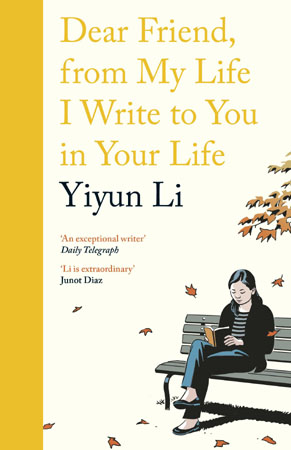What compels us to read so much? What relationship is formed between the author and reader in the process? How does our understanding of a book change over the course of our lives? I think there are moments in every committed reader's life when they find themselves reflecting upon these and similar questions – caught as we are in the strange alchemy of this intensely private and oftentimes lonely activity which connects us to the rest of humanity. Yiyun Li intelligently and movingly addresses these concerns and many more through recollections about her life and experience as a reader and writer. Probably not since reading Annie Dillard or Antoine de Saint-Exupery have I encountered memoirist essays that speak so profoundly about the experience of living. The title of this book is taken from a line in Katherine Mansfield's notebooks. Li takes this concept of the way written language straddles time and particular existence to reflect on a life in literature.
I took my time reading these essays over a couple of months, dipping in and out, copying lines and spending a lot of time thinking about their meaning. Li packs a lot into each sentence with concepts that frequently comfort, intrigue or provoke. In an afterward to one essay she explains how long she took over writing the book. It shows in the density of the writing that she spent a lot of time fretting over and reworking her ideas. She seems torn about whether she's getting it right or if writing about herself should even be allowed: “I am not an autobiographical writer – one cannot be without a solid and explicable self – and read all autobiographical writers with the same curiosity. What kind of life permits a person the right to become his own subject?” This says a lot about the intensity of her process and the emotionally tumultuous period in which she wrote this book. References are occasionally made to two different times she spent in a hospital and her suicide attempt.
Reading is her anchor and the thing which makes her feel what she most desires which is to be alone and invisible: “If aloneness is inevitable, I want to believe that aloneness is what I have desired because it is happiness itself.” She suggests in this line that what she must believe (without wanting to) is that the human instinct is to connect to others. Reading is the method which provides such contact that takes her out of the immediacy of time and removes others from witnessing her. Contact with others causes intense self-consciousness: “The indifference of strangers is not far from that of characters, yet the latter do not make one feel exposed.” Although writing provides a more comfortable one step of removal from people she also feels that “to write betrays one's instinct to curl up and hide.” But the process is a necessary one because it assuages her from the sense that existence is pointless: “Often I think that if writing is a futile effort; so is reading; so is living. Loneliness is the inability to speak with another in one's private language.”
The Portrait of Marguerite van Mons by Theo van Rysselberghe on the cover of Li’s paperback edition of Bowen’s The Death of the Heart
In these essays Li considers the writing and interactions between authors such as Elizabeth Bowen, Graham Greene, Thomas Hardy, John McGahern, Vladimir Nabokov, Ivan Turgenev, William Trevor and Virginia Woolf. The essays focus upon subjects such as relationships in literature (between reader/writer, writer/writer, teacher/prodigy), the role of melodrama in our lives and literature, writing exclusively in a second language, creating characters in fiction and the way we mentally turn real people into characters and the challenges of the writing process. She recounts her state as a Chinese immigrant to America, her conviction to become a writer over her profession as a scientist, disturbing/poignant encounters with readers of her own writing and her connections with other writers. Li is beautifully adept at teasing out contradictions between her instincts and logic. For instance, she believes that “A writer and a reader should never be allowed to meet. They live in different time frames. When a book takes on a life for a reader it is already dead for the writer.” So she fully realizes the irony in successfully seeking out a friendship with William Trevor whose writing she worships.
“Dear Friend, from My Life I Write to You in Your Life” inspires that special kind of feeling of being so personal to its author, yet it feels like it was written especially for you. A connection which is more meaningful than ever meeting in person is that contact through the page. Yiyun Li beautifully articulates that special kind of intimacy. It's a book I know I'll permanently keep on a nearby shelf to return to - like a friend I don’t necessarily want frequent contact with but who I want to know is near beside me.









